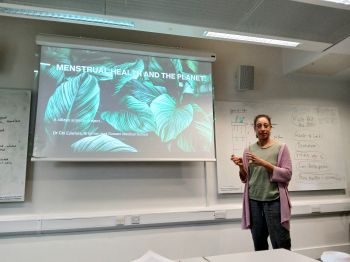Engaging young people with climate change and the environment
By: Edwin Gilson
Last updated: Thursday, 23 January 2025

Dr Chi Eziefula introduces her research on menstrual health
Children and young people are, and will be, on the frontline of climate change around the world. And yet their voices and concerns are often left out of public discourse and policy discussions around the environment and sustainability.
Addressing this lack, SSRP hosted a workshop with the Centre for Innovation and Research in Childhood and Youth (CIRCY) - with support from the Widening Participation team - aimed at exploring the sustainability issues that matter to young people.
The event was part of the Study and See Conference, in which local sixth-form students sample short taster sessions on a variety of subjects.
The SSRP and CIRCY workshop, entitled 'Climate Change and the Environment: Exploring through Youth and Childhood, Youth and Education, Arts and Gaming' was led by SSRP's Dr Perpetua Kirby, whose own research is based around sustainability education.
The event featured three short presentations from SSRP researchers Dr Emanuela Orlando, Dr Chi Eziefula and PGR Kathleen Bailey, and a demonstration of an in-development sustainability role-playing game from Dr Jo Walton.
Firstly, Dr Emanuela Orlando (Associate Professor in Environmental Law) presented her work on eco-anxiety and human rights.
She said that the link between nature and mental health is two-sided. Access to nature has been proven to be beneficial to mental health, while environmental degradation is detrimental. These concerns are deepened by government inaction and feelings of powerlessness.
Bringing her law expertise into the discussion, Dr Orlando pointed out that there have been numerous cases recently in which young people, with the help of laywers, have held governments to account over their failure to hit climate targets. This empowers young people to use human rights litigation to help safeguard their future.
The legal system, then, has the potential to be a powerful tool in the campaign to mitigate the worst of climate change and oppose environmental injustice.
Next, Dr Chi Eziefula (Senior Lecturer in Infectious Diseases at the Brighton and Sussex Medical School) discussed the issue of menstrual health, drawing on research conducted in Uganda, Sudan, Kenya and the UK.
Dr Eziefula explored the intersections between the physical, emotional, mental, and social dimensions of menstrual health, within the context of human rights and social justice. She raised the issues of schooling and education, affordability and poverty, gender equality and safety.
Finally, Dr Eziefula revealed the environmental impact of menstrual products, which are very often single-use and made of plastics containing potentially harmful chemicals. People who menstruate have no choice but to use these products, meaning their bodies are being polluted.
Dr Eziefula concluded her talk by asking attendees to think of their 'three wishes' for more equitable, sustainable menstrual health.
Kathleen Bailey (PGR in the School of Education and Social Work) posed the question: 'what is nature to children?'
She followed this up by relating some of her experiences working with children in natural settings, in which she encouraged them to think about their attitudes to and relationships with nature.
In one particular session, she asked asked children whether a range of natural and man-made objects constituted 'nature', including a helicopter landing nearby. The children responded that all of the objects were 'nature'.
This made Kathleen think that children do not have a clear idea of what nature is - a direct result of sustainability and the environment being absent in the early years curriculum. She added that educators often consider children too innocent and vulnerable to engage with sustainability issues like food production, and that this omission from the curriculm helps to drive the dissonance between lifestyles and enviornmental degradation.
Kathleen left us with the questions: should we talk to children about these issues? And do educators need special sustainability training to engage children in the issues?
Rounding off the session, Dr Jo Walton (Principal Research Fellow in Arts, Climate and Technology) introduced a role-playing game he is developing with Dr Kirby and colleagues.
In the game, each team must make decisions over the best way to maintain a farm, balancing economic considerations with the demands of food production and biodiversity conservation - while always bearing in mind the global impacts of these localised decisions.
Dr Walton and Dr Kirby are thinking about ways to expand the game, involving schoolchildren from different countries and adding a digital dimension.
Thank you to all who attended, and to our researchers for sharing their fascinating sustainability research. SSRP will continue to work towards an engaging and inclusive model of sustainability education for young people.

